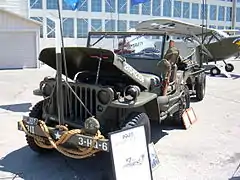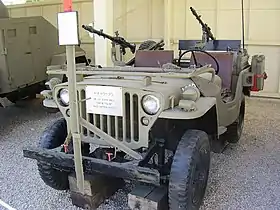Wire catcher
A wire catcher (also known as Wire Cutter or Wire Anti-Decapitation Device) is a device used to protect military personnel in open vehicles against taut-wire traps.

Design
A wire catcher consists of a strip of angle iron bolted upright to the forward bumper of a jeep.[1][2][3] "It extends above the heads of those riding in the jeep, and is notched a few inches from the top so that any wire extending across the road will be caught and snipped."[1]
History
The first land vehicle wire cutter to be demonstrated was attached to a Killen-Strait tractor for the British in 1915. Two scissor-like Royal Navy torpedo net cutters were fitted to the front of the tractor at the end of two protruding shaped metal rods. The tractor was driven into a field of tensioned barbed wire that had been strung up at precisely the cutter's height. It was not effective with wire at different heights and was not put into service.[4] Heavy tanks were used simply to crush barbed wire obstacles instead.
During World War II, the Germans employed taut-wire traps strung across roadways designed to harm enemy soldiers riding in open vehicles such as jeeps and motorcycles.[5] Wire catchers were installed on jeeps as field modifications.[2][5]
Wire catchers were used up through the Vietnam War.[6]
Gallery
_owned_by_Paul_Bater_pic1.JPG.webp) 1942 Ford GPW with wire catcher
1942 Ford GPW with wire catcher_owned_by_Andrew_Meardon_pic1.JPG.webp) 1944 Ford GPW with wire catcher
1944 Ford GPW with wire catcher Willys Jeep with wire catcher
Willys Jeep with wire catcher 1945 Willys MB Jeep with wire catcher
1945 Willys MB Jeep with wire catcher Willys MB Jeep from the Samson's Foxes unit in the independence war (1948) with wire catcher
Willys MB Jeep from the Samson's Foxes unit in the independence war (1948) with wire catcher
See also
- Rhino tank (with Culin hedgerow cutter)
- Wire strike protection system
References
- "New Jobs for the Army Jeep". Popular Science. 145 (6): 105. December 1944.
- Kappelman, Glenn L. (2003). Through My Sights: A Gunner's View of WWII. Sunflower Publishing. ISBN 978-0-9704764-1-8.
- Wong, John B. (2004). Battle Bridges. Trafford Publishing. p. 470.
- Moore, Craig (March 25, 2017). "Killen-Strait Armoured Tractor". Tank Encyclopedia.
- Helms, Glenda Geeslin (2015). From the Eagle's Nest: Growing Up in Goldthwaite.
- Smith, Chuck (2018). Vietnam: Stories from a War. Lulu Press.
Further reading
- Mick Bowley, THE JEEP WIRE CUTTER The Newsletter of World War 2 Jeeps, NSW, October 2006 – Volume No.93, page 18 online-pdf
External links
- 'Wire Anti-Decapitation Device from 42fordgpw.com